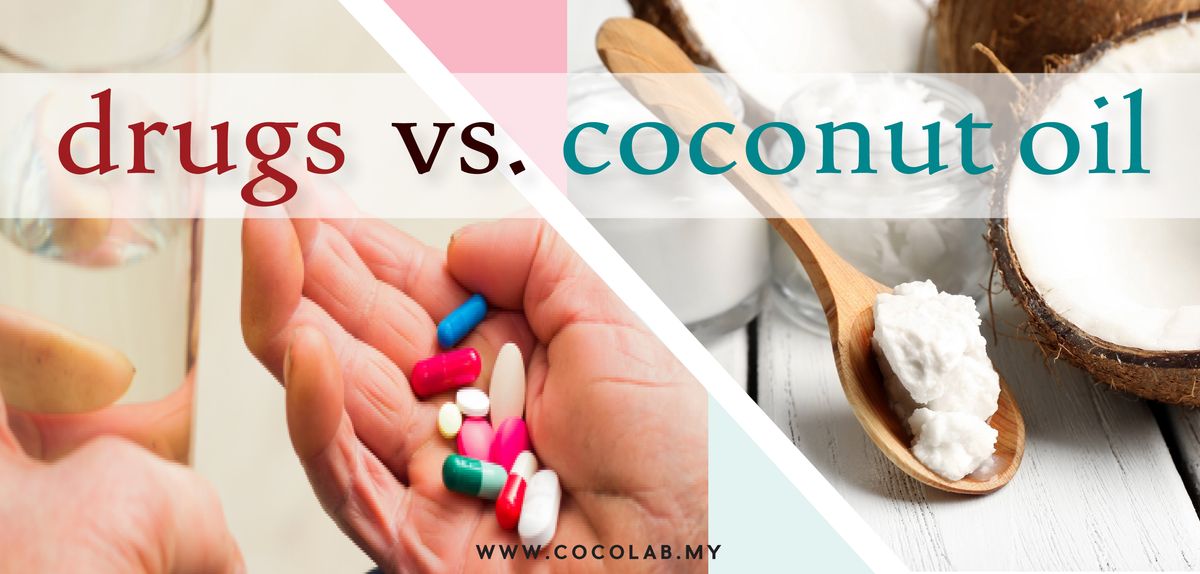
A group of New York City’s Mt. Sinai Medical School researchers set out to analyze why and how coconut oil affects Alzheimer’s Disease (AD) patients favorably. They acknowledged some efficacy from coconut oil, and they wanted to know more.
Since most drug trials to develop an Alzheimer’s drug have failed miserably, the motivation to study coconut oil in order to understand how it positively affects AD was probably motivated by a desire to patent a new drug that could work similar to coconut oil, a natural food that cannot be patented.
Their research was based on earlier animal studies of virgin coconut oil’s effect on mouse models of coconut oil as well as other in vitro (lab culture) studies. The researchers also acknowledged the existence of many anecdotal testimonies of AD (Alzheimer’s disease) patients, such as this one.
The Mt. Sinai report was published in the journal Science Direct, Brain Research with the title: Coconut oil decreases expression of amyloid precursor protein (APP) and secretion of amyloid peptides through inhibition of ADP-ribosylation factor 1 (ARF1).
Decoding the Study’s Terminology and Presenting a Summary of Its Findings
This study demands interpretations of terms used for those of us who aren’t biologists.
Amyloid plaque has been found postmortem in the brains of Alzheimer’s victims. It is a waxy substance that inhibits the brain’s neurotransmissions and causes neuron dysfunction and degeneration.
Amyloid precursor protein (APP) is a protein that is linked with the development of Alzheimer’s disease in humans. It generates Aβ(amyloid beta) peptides within brain cells that are responsible for forming plaques in brain tissues of Alzheimer’s victims. (Source)
ADP-ribosylation factor 1 (ARF1) is a genetic DNA function that binds proteins.
The in vitro (lab culture) cells used for this study are N2a cells:
A mouse Neuroblastoma cell line frequently used in biological research for studies in psychiatry, cell biology, neuroscience, cancer, etc. (Source)
Excerpts from the study abstract:
In humans, mutations in the amyloid precursor protein (APP) gene has been implicated in increased plaque formation, which can block the communication between nerve cells, decrease dendritic formation [branch like extensions of neurons] and increase cell death, and promote neuroinflammation.
Our data suggest that ADP-Ribosylation Factor 1 (ARF1) may contribute to the effects of coconut oil on APP expression and secretion of Aβ [Amyloid beta].
These results suggest that coconut oil decreases intracellular ARF1 expression, thereby resulting in an inhibition of APP and amyloid β secretion. This study reveals a novel mechanism for intracellular APP processing in neuronal cells. (Access complete study)
Though beyond the scope of this study, the authors also mention the unique quality of coconut oil’s medium-chain fatty acids, which are easily metabolized by the liver and converted into ketones that provide energy to brain neurons. The researchers suggest this should be studied separately as well.
This study may be the most comprehensive understanding of coconut oil’s success with Alzheimer’s disease (AD).
Beyond the Amyloid Plaque Theory of Alzheimer’s Disease (AD)
It’s good that a current study validates the virtues of virgin coconut oil instead of attacking it, simply because it is a saturated fat.
Coconut oil disinformation from “authorities” who still cling to the outdated, unscientific supposition that saturated fats are “bad,” while recommending fat and oil substitutes that are harmful, has clouded the health virtues of coconut oil that have been rediscovered over the past very few decades.
But the aforementioned study’s discovery of how coconut oil obstructs precursors to amyloid plaque build-up is focusing on the unproven theory of amyloid plaque and tau protein neurofibrillary tangles in the brain as the causative factors of Alzheimer’s.
These are discovered in cadavers and autopsies of Alzheimer’s victims.
But are they causative or manifestations of some other more basic disorder?
A growing movement of researchers and medical experts are challenging this most widely accepted basis of Alzheimer’s as they observe the pharmaceutical industry’s repetitive failures of not coming close to creating a marketable drug for Alzheimer’s disease. See:
New Alzheimer’s Drugs Continue to Fail Where Coconut Oil Shines
One study using postmortem examinations of “super-agers” showed amyloid plaques contained in brains of individuals who did not suffer from dementia. They all had scored highly on memory and cognition testing, some even when they were into their 90s. (Source)
University of Texas (Austin) Ph.D. candidate Cheasequah Blevins stated:
The findings support growing evidence that plaques and tangles might not be a direct cause of Alzheimer’s. A lot of money was spent on getting rid of plaques, but it didn’t help – it actually made the patients quite sick.
Rudolph E. Tanzi, Ph.D. Professor of Neurology at Harvard Medical School was even more assertive, claiming overactive immune cells trigger inflammation in the brain leading to Alzheimer’s:
As I’ve said for years, but pharmaceutical companies don’t seem to listen, treating beta-amyloid in patients who already have clinical symptoms is too late. Once dementia begins, the brain must be saved by stopping neuroinflammation. (Source)
A well known mainstream medical scientist, Dr. Dale Bredesen, author of The End of Alzheimer’s could be the spokesperson for the Alzheimer’s disease splinter group of physicians and researchers who remain unconvinced of beta-amyloid plaque as the cause of AD.
As a matter of fact, Bredesen’s research indicates amyloid plaque formations are attempts to protect the brain from inflammatory conditions.
This is similar to how cholesterol attempts to seal damage from inflammation in arteries but is blamed for causing arteriosclerosis instead of being recognized as the body’s attempt to halt further damage.See:
How Functional Medicine Can Cure Dementia and Alzheimer’s Disease
Seeking the Sources of Inflammation That are Responsible for Our AD Epidemic
There are others who support brain inflammation as the source of Alzheimer’s. But what could be causing the inflammation?
A recent study examined the brains donated by family members of deceased AD victims and discovered high levels of unbound aluminum, which is toxic to all cells and easily passes through the brain’s blood-brain barrier.
Sources of unbound or free aluminum that gets into brains are vaccines and aluminum nanoparticle residue from pollution in the atmosphere. See:
Study: High Amounts of Aluminum in Brains of Alzheimer’s Patients
A number of medical professionals assume what many consider an epidemic in rising rates of AD is due to so many baby-boomers aging at the same time. Along with the recent baby-boomer maturation, vaccination rates have expanded, especially with aluminum-containing flu shots, and geoengineering has proliferated throughout most industrialized societies. See:
Artificial Clouds and Geoengineering: Public Exposed to Toxic Chemicals
The overactive immune cells Professor Tanzi had mentioned in the quote above is a hallmark of a vaccine reaction known as a cytokine storm, where the immune system is overly stimulated and constantly releases immune cells that attack a host’s organs, especially the nervous system and brain,instead of pathogenic microbes or toxins.
An overly stimulated immune response creates chronic inflammation over time and is the basis of autoimmune diseases. This has only been discovered recently. It’s evident that vaccine adverse reactions are often cytokine storms.
Retired neurosurgeon, neurology professor and author Dr. Russell Blaylock explains:
These destructive chemicals [in vaccines], as well as the free radicals they generate, are diffused throughout the nervous system doing damage, a process called bystander injury. It’s sort of like throwing a bomb in a crowd.
The problem with our present vaccine policy is that so many vaccines are being given so close together and over such a long period that the brain’s immune system is constantly activated. This has been shown experimentally in numerous studies. This means that the brain will be exposed to large amounts of the excitotoxins as well as the immune cytokines over the same period. (Source)
It seems plausible that cytokine storms triggered by vaccine adjuvants such as aluminum, or vaccine preservatives such as mercury, could be sources of brain inflammation that create Alzheimer’s disease.
Coconut Oil Benefits for Alzheimer’s May Involve Other Causes of Alzheimer’s Disease (AD)
In addition to inflammatory and toxic contributions to AD, Dr. Bredesen also cites insufficient nutrition to the brain’s cells. That suggests metabolic issues.
Some medical experts contend that neurons can lack glucose for metabolism due to insulin resistance in the brain’s cells, much like type 2 diabetes. Thus, the notion of Alzheimer’s disease as a “type 3” form of diabetes became hypothesized.
Coconut oil’s easy conversion of medium chain fatty acids or medium chain triglycerides (MCT) into ketones resolves type 3 diabetes by providing energy sources that don’t require insulin to bring them into the brain cells (neurons) – ketones. See:
How Ketones as Brain Fuel can Prevent Alzheimer’s Disease
Further research into this aspect of coconut oil’s efficacy without harmful side effects was suggested by the Mt. Sinai study.
But there’s no need to safety-test coconut oil as a natural agent, since it is a food that has been part of human nutrition for thousands of years. It has been empirically proven as beneficial for most cases of dementia.
It appears that coconut oil handles many, if not most, of the brain degeneration issues surrounding Alzheimer’s disease and other neurological maladies.
Consuming two to four spoonfuls of coconut oil daily has succeeded safely with AD family members according to many testimonials. It provides a preventative measure during the early stages of dementia, inhibits dementia development, and even reverses later stages of Alzheimer’s symptoms.
The article below contains links to several testimonials on coconut oil’s success for dementia and AD after the Health Impact News editorial summary of the article’s featured study. See:
Coconut Oil Improves Cognitive Functioning in Alzheimer’s Patients
Keep your health and your loved one's health in check with natural health supplements. Keep a look out for ingredients that stresses on building your immunity and maintaining tip-top organ function. Natural sources such as Virgin Coconut Oil or Medium Chain Triglycerides are a good place to start. It is also advisable that whilst taking care of Alzheimer's patients, you may want to look out for supplements that help with brain health such as Vitamin E Tocotrienols and Lycopene. These ingredients are known for boosting brain and cognitive function, whilst providing vital energy for the brain and the rest of the body.
We highly recommend the COCOLAB Absolute No Heat ® (ANH) Virgin Coconut Oil + Super Vitamin E + Lycopene softgels as a solution to boosting your overall health, energy levels, organ function and brain function. Its superior grade ANH-Virgin Coconut Oil base is the best way to ensure that these vital vitamins are effectively directed and distributed in the body. Regular consumption of these softgels will produce noticeable health results not only for the body, but most importantly for the brain.
Try out a bottle of the COCOLAB Absolute No Heat ® (ANH) Virgin Coconut Oil + Super Vitamin E + Lycopene softgels today as your go-to health solution!
Available in physical retail outlets or online at www.cocolab.my




